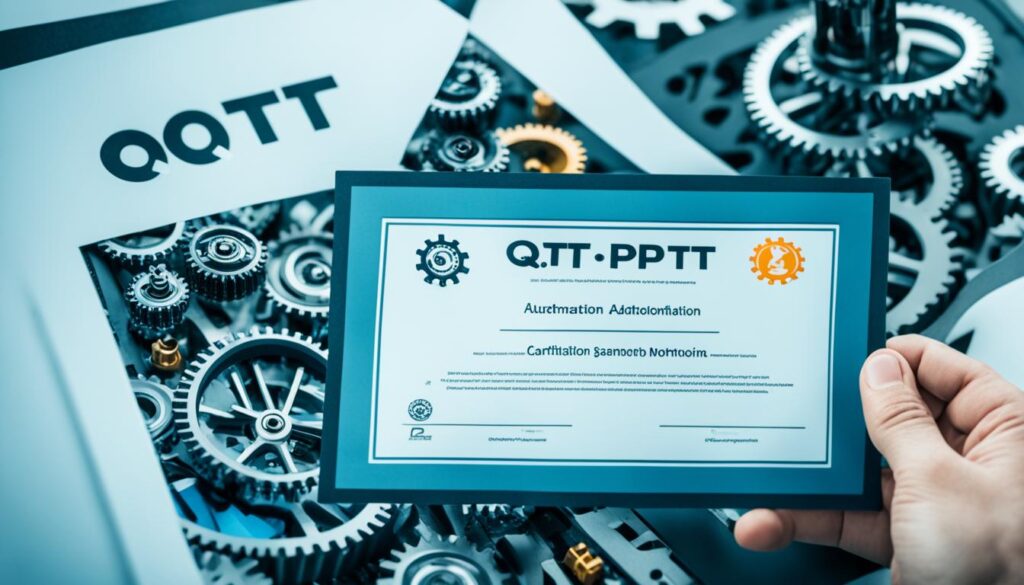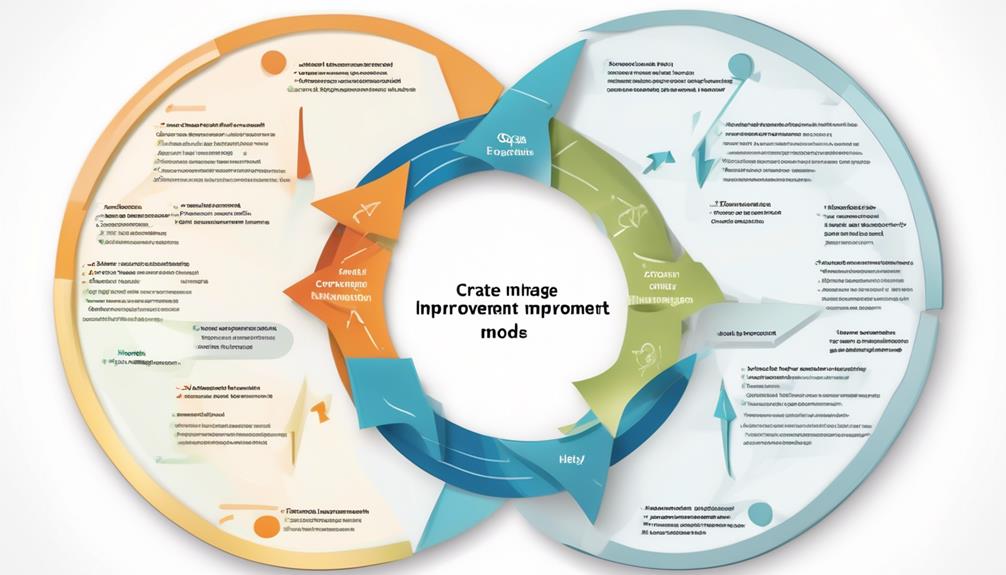Resources and Training
Unlock Your Career Potential: How to Become a Software Quality Assurance Engineer
Learn how to become a software quality assurance engineer with our comprehensive guide! From skills to education, we've got you covered on the path to this rewarding career.

Exploring the realm of a Software Quality Assurance Engineer is akin to navigating a intricate digital terrain, where achieving success is determined by purposeful decisions and careful actions.
From mastering a programming language to honing essential soft skills, the road to becoming a QA Engineer is multifaceted and demands meticulous attention to detail.
But fear not, for we have compiled a comprehensive guide to help you navigate this terrain and emerge as a proficient and sought-after professional in the world of software quality assurance.
Key Takeaways
- Strong understanding of programming languages and software development methodologies is necessary for a Software Quality Assurance Engineer.
- Proficiency in manual and automated testing tools and frameworks is essential for effective software testing.
- Acquiring practical experience through internships and hands-on skills is crucial for excelling as a QA engineer.
- Obtaining professional certifications and building a portfolio showcasing successful testing scenarios and bug reports can enhance career prospects in software quality assurance.
Necessary Skills and Qualifications
We require a strong understanding of various programming languages, including Java, C#, Python, or others, for the role of a Software Quality Assurance Engineer.
As a Software Quality Assurance Engineer, a deep comprehension of software development and testing methodologies is essential. Proficiency in manual and automated testing tools and frameworks is a critical aspect of the role.
Additionally, a solid knowledge of the Software Development Life Cycle (SDLC) and development methodologies is imperative for success in this career. Excellent communication and collaboration skills are also necessary for effective interaction with development teams and stakeholders.
To excel in the field of Software Quality Assurance, a degree in computer science or a related field is often required. Furthermore, obtaining certifications such as Certified Software Quality Engineer (CSQE) can significantly enhance one’s credentials and career prospects.
A comprehensive understanding of automation tools and their application in the QA process is also crucial. With these qualifications and skills, a Software Quality Assurance Engineer can effectively contribute to the development of high-quality and reliable software systems.
Practical Experience and Internships

Transitioning from the necessary skills and qualifications, practical experience and internships play a pivotal role in gaining hands-on skills and applying theoretical knowledge in real-world scenarios for aspiring Software Quality Assurance Engineers.
Internships and entry-level positions offer valuable opportunities to immerse oneself in the practical aspects of software quality assurance. Through internships, individuals can gain exposure to testing processes, explore various programming languages, and understand the development process within a real-world context. These experiences provide a platform to apply theoretical knowledge to actual projects, enhancing one’s understanding of industry best practices and tools utilized in software quality assurance.
Working under the guidance of experienced professionals during internships allows individuals to learn from their expertise and gain insights into the day-to-day responsibilities of QA engineers. It’s during these internships that individuals can test their skills, gain experience in real-world testing scenarios, and acquire the necessary hands-on experience to excel as Software Quality Assurance Engineers.
Therefore, actively seeking internship opportunities and entry-level positions is crucial for those looking to transition theoretical knowledge into practical expertise within the field of software quality assurance.
Professional Certification and Portfolio

Professional certification in software quality assurance provides a tangible demonstration of expertise and proficiency in the field. It’s essential for software quality assurance engineers to obtain professional certification to validate their skills and knowledge. Seek certification in popular quality assurance methodologies such as Six Sigma or Agile to showcase a comprehensive understanding of industry best practices. Join professional organizations related to software quality assurance to stay updated with the latest trends and network with industry professionals.
Building a portfolio is also crucial when pursuing professional certification and showcasing your skills. Include examples of successful software testing scenarios and bug reports in your portfolio to highlight your technical skills and attention to detail. Additionally, showcase your projects, test plans, and quality assurance strategies to demonstrate your ability to ensure the quality of software products. By having a strong portfolio, you can effectively demonstrate your expertise and increase your chances of career advancement in the field.
Job Search and Technical Interview Preparation

As we pivot our focus to the job search and technical interview preparation, it’s crucial to research and apply to companies that prioritize software quality assurance and testing roles.
When looking for positions as software quality assurance engineers, having a computer degree and knowledge of testing tools like Selenium can be advantageous. It’s important to showcase your understanding of both manual testing and automated tests, as well as your ability to write test cases during technical interviews.
Additionally, preparing for technical interviews should involve practicing coding problems, understanding testing methodologies, and familiarizing yourself with common quality assurance tools and practices. Networking with professionals in the quality assurance and software testing field can provide valuable insights and help refine your interview preparation.
During technical interviews, demonstrating problem-solving skills, attention to detail, and the ability to work within teams can impress potential employers.
Job search and technical interview preparation require a methodical and analytical approach to ensure readiness for the demands of the software testing industry.
Essential Soft Skills
Developing essential soft skills is crucial for software quality assurance engineers to effectively collaborate with development teams and stakeholders. Spotting and documenting bugs, meeting strict deadlines, addressing software issues, and balancing multiple tasks in a fast-paced development environment are all important aspects of the job.
As quality assurance engineers, we must possess strong communication skills to interact with various teams and stakeholders. This ensures that everyone is aligned on project goals and requirements. Exceptional attention to detail is necessary for meticulously spotting and documenting bugs and issues, ensuring the delivery of high-quality products.
Additionally, patience and perseverance are essential traits for meeting strict deadlines and addressing complex problems that may arise during product development. Good problem-solving skills are crucial for effectively addressing software issues and continuously improving quality standards.
Finally, effective time management skills are vital for balancing multiple tasks and responsibilities in a fast-paced environment. This ensures that all aspects of manual and automated testing are covered thoroughly.
These essential soft skills are paramount for success in the field of software quality assurance engineering.
Frequently Asked Questions
How Long Does It Take to Become a Software Quality Assurance Engineer?
It takes time to become a software quality assurance engineer.
We need to pursue a bachelor’s degree in computer science or a related field, gain practical experience through internships or entry-level positions, and consider obtaining relevant certifications.
Continuous learning through online courses, workshops, and industry publications is essential.
Additionally, enhancing communication skills for collaboration with development teams and stakeholders is crucial.
These steps collectively contribute to the development of a well-rounded software quality assurance engineer.
How Do I Start a Career in Software Quality Assurance?
We start a career in software quality assurance by specializing in a programming language and pursuing specialized training in coding and software development.
We gain practical experience through internships or entry-level positions and continuously refine our technical skills.
We also develop strong communication skills, seek professional certifications, and stay informed about the latest trends in the industry.
Continuous learning, collaboration with development teams, and networking with industry professionals are essential for success.
What Qualification Is Needed for a QA Engineer?
To become a Software Quality Assurance Engineer, a bachelor’s degree in computer science or a related field is often preferred by employers. Practical experience through internships or entry-level positions is valuable.
Strong communication skills and the ability to work well with different groups are essential. Obtaining relevant certifications can enhance professional credibility.
Staying informed about the latest trends and advancements in software quality assurance through continuous learning and professional development is crucial.
How Do I Start Working as a QA Engineer?
We start working as a QA engineer by gaining a strong foundation in computer science and specializing in a programming language like Java, C#, or Python.
Seeking internships or entry-level positions in QA helps gain practical experience.
Developing skills in software testing and quality assurance, continuously refining technical skills, and obtaining professional certifications enhances professional credibility.
It’s essential to stay updated with the latest industry trends and best practices.
Conclusion
In conclusion, becoming a Software Quality Assurance Engineer is like building a sturdy foundation for a skyscraper. It requires a strong base of technical skills, reinforced with practical experience and professional certification.
Just like a skyscraper requires attention to detail and precision, so does the role of a QA Engineer. By continuously honing our skills and staying up to date with industry practices, we can ensure the software we test is as solid as a well-built skyscraper.
Rick, our Software Quality Assurance Writer, is the creative force behind many of our insightful articles and course materials. His unique background in software development, fused with his natural flair for writing, allows him to convey complex QA concepts in a way that is both informative and captivating. Rick is committed to keeping abreast of the latest trends and advancements in software testing, ensuring that our content remains not just relevant, but at the forefront of the field. His significant contributions are instrumental in helping us fulfill our mission to deliver premier QA education.
Resources and Training
Advantages of Studying Software Quality Assurance
Studying Software Quality Assurance is essential for understanding the process of ensuring software quality and reliability. Learn the importance and benefits of studying this subject.

In the realm of software development, emphasizing the significance of delivering a high-quality end product is frequent. Yet, what is frequently ignored is the essential role that software quality assurance plays in attaining this objective.
By studying software quality assurance, we uncover the essential methods and techniques required to identify and rectify potential issues before they impact the end-user experience. This not only saves time and resources but also establishes trust and reliability in the software development process.
But what exactly are these methods and techniques, and how do they contribute to the overall success of a software project? Let’s explore the reasons behind the growing importance of studying software quality assurance.
Key Takeaways
- Software Quality Assurance is important for mitigating errors, preventing disruptions, and building customer trust and loyalty.
- Studying Software Quality Assurance enhances software development processes and ensures meeting and exceeding industry quality standards.
- SQA techniques such as auditing, reviewing, code inspection, and simulation ensure high-quality software products.
- SQA plays a crucial role in the software industry by ensuring software products meet quality specifications, adhering to industry standards and regulations, and focusing on process improvement and defect management approaches.
Importance of Software Quality Assurance
Ensuring software quality assurance is essential for businesses to mitigate errors, prevent disruptions, and build customer trust and loyalty. By studying the subject of software quality assurance, individuals can grasp the critical importance of this discipline.
The significance of software quality assurance can’t be overstated. It saves both time and money by avoiding errors and the need for fixes, patches, and upgrades. Moreover, it prevents breakdowns and disruptions, ensuring continuous customer access. This not only boosts consumer confidence but also enhances the organization’s reputation for quality, leading to increased market share and a competitive advantage.
Furthermore, software quality assurance plays a pivotal role in ensuring security, compliance, and the protection of sensitive data. Understanding the importance of software quality assurance is fundamental for anyone wishing to excel in this field.
As we delve deeper into this article, it becomes evident that choosing to study software quality assurance is a strategic decision, considering its crucial role in modern business operations.
Benefits of Studying SQA

Studying software quality assurance provides a comprehensive understanding of the principles and methodologies essential for ensuring the reliability and effectiveness of software products and systems. By delving into this subject, we gain insights into the intricacies of software quality attributes, development processes, and quality standards. Here are the benefits of studying SQA:
Benefits of Studying SQA 1. In-depth knowledge of software testing and QA Understanding the intricacies of testing and QA processes equips us with the skills to identify and rectify software flaws effectively. 2. Ability to create a Software Quality Assurance Plan Mastery of SQA enables us to develop comprehensive plans to ensure the quality of software throughout the development lifecycle. 3. Enhancing software development processes Implementing SQA practices leads to improved development processes, resulting in higher-quality software. 4. Meeting quality standards Studying SQA equips us with the expertise to meet and exceed industry quality standards, ensuring the delivery of reliable software products. 5. Ensuring customer satisfaction Through SQA, we can ensure that software meets user expectations, ultimately enhancing customer satisfaction.
Studying SQA empowers us with the knowledge and skills to drive the development of high-quality, reliable software products while meeting industry standards and customer expectations.
SQA Plan and Techniques
Implementing a well-structured SQA plan and utilizing effective techniques is crucial for the successful alignment of software products with requirements and for ensuring the reliability and quality of the end result.
The SQA plan serves as a roadmap for the team, outlining responsibilities, work products, and review areas. It includes the purpose, reference, testing methodology, procedures, techniques, and tools to be employed throughout the software development process.
SQA techniques, such as auditing, reviewing, code inspection, design inspection, and simulation, play a vital role in ensuring the high-quality of software products. These techniques aid in identifying and addressing potential issues early in the development process, ultimately leading to a more robust end product.
Additionally, SQA activities involve creating an SQA Management Plan, setting checkpoints, and conducting formal technical reviews to maintain the quality of the project.
Adhering to industry standards such as ISO 9000, CMMI, and TMMi further guides the team in effectively managing software quality and testing processes.
Role of SQA in Software Industry

We play a pivotal role in the software industry by ensuring that software products meet quality specifications and adhere to industry standards and regulations.
As Software Quality Assurance (SQA) professionals, we work parallel to the software development life cycle, aiming to catch product shortcomings before public release.
Our role goes beyond software testing and quality control; it involves techniques such as auditing, reviewing, code inspection, and simulation.
By focusing on process improvement and defect management approaches, we ensure higher quality software products, reducing the need for constant patches and upgrades. This, in turn, increases customer satisfaction and trust.
Moreover, SQA plays a crucial role in ensuring security and data protection, adhering to industry standards and regulations for data security and privacy.
Our work contributes to the overall efficiency of software engineering processes, ultimately leading to the delivery of reliable and robust software products.
As SQA professionals, we’re at the forefront of ensuring that software products not only meet quality standards but also exceed customer expectations.
SQA Standards and Practices
SQA standards and practices ensure that software products consistently meet predefined quality specifications and adhere to industry regulations and standards. This is crucial for maintaining the integrity and reliability of software products.
The following are key aspects of SQA standards and practices:
- Verification of Procedures and Processes: SQA standards and practices verify the implementation of procedures and processes to ensure that they align with industry standards and best practices.
- Parallel Work with Software Development: SQA standards and practices work in parallel to software development throughout the life cycle, ensuring that quality is built into the product from the early stages.
- Early Detection of Product Shortcomings: SQA standards and practices aim to catch product shortcomings before public release, thereby preventing potential issues from reaching end-users.
- Distinction from Software Testing: It’s important to note that SQA standards and practices are different from software testing, as they encompass a broader scope that includes the entire software development process.
Understanding SQA standards and practices is essential for software engineers and professionals involved in Quality Assurance and Quality Control, as it directly impacts the overall quality and reliability of software products.
Frequently Asked Questions
Why Do You Want to Go Into the Field of Software Quality Assurance?
We are drawn to the field of software quality assurance because we see the impact that our work can have on ensuring the delivery of high-quality, stable, and competitive software products. Our passion lies in consistently monitoring and improving processes to reduce the need for constant patches and upgrades, enhancing customer satisfaction, minimizing risks, and validating error-free code.
We’re committed to ensuring the performance, usability, and security of software products.
Why Study Quality Assurance Is Important?
Studying quality assurance is important because it ensures higher quality software products. This helps to reduce the need for constant patches and increases customer satisfaction.
By minimizing risks and legal issues, quality assurance also improves overall efficiency and productivity in the development process. It helps to address potential objections and saves time and resources in the long run.
Our mastery of software quality assurance principles empowers us to deliver reliable and top-notch software solutions.
What Is Software Quality Assurance and Why Is It Important?
Software Quality Assurance (SQA) is the process of ensuring software meets quality standards and adheres to established procedures. It’s vital for catching product flaws before release, saving time and money, boosting customer confidence, and enhancing security.
SQA includes techniques like auditing, code inspection, and testing. By implementing SQA, we guarantee high-quality software, reducing the need for constant updates and patches while increasing customer satisfaction.
Why Is Software Assurance Important?
Why is software assurance important?
It’s vital because it ensures that our products meet high quality standards, reduces the need for constant patches, and builds trust with our customers. Without it, we’d face increased risks and potential legal issues.
Additionally, it improves efficiency and productivity in our development process. In short, software assurance is crucial for delivering reliable, top-notch products that keep our customers satisfied and our business thriving.
Conclusion
In conclusion, studying software quality assurance is crucial for ensuring top-notch software products. It equips us with the necessary skills to catch potential issues before release, minimize risks, and improve overall efficiency in the development process.
By mastering SQA, we can guarantee customer satisfaction and trust, making it an indispensable aspect of the software industry.
Trust us, studying SQA is a game-changer for a successful career in software development!
Rick, our Software Quality Assurance Writer, is the creative force behind many of our insightful articles and course materials. His unique background in software development, fused with his natural flair for writing, allows him to convey complex QA concepts in a way that is both informative and captivating. Rick is committed to keeping abreast of the latest trends and advancements in software testing, ensuring that our content remains not just relevant, but at the forefront of the field. His significant contributions are instrumental in helping us fulfill our mission to deliver premier QA education.
Resources and Training
Comprehensive QTP Training Courses – Enroll Now!

Are you interested in improving your automation testing skills? You’re in luck! H2K Infosys provides thorough QTP (Quick Test Professional) training programs designed to give you the necessary theoretical understanding and hands-on experience to succeed in this fast-evolving field.
Our online QTP training program is designed for beginners as well as experienced professionals who want to upgrade their skills. Whether you are a software tester, QA analyst, or a programmer looking to specialize in automation testing, our advanced QTP course is tailored to meet your needs.
With our best-in-class trainers and expert-led sessions, you will gain a deep understanding of QTP and learn how to use it effectively for test automation. Our comprehensive curriculum covers all the necessary topics, including QTP Testing, QTP automation training, and QTP certification, ensuring that you are well-prepared to take on real-world automation projects.
At H2K Infosys, we understand the importance of hands-on training. That’s why our QTP training includes practical assignments and real-time examples to help you apply what you have learned. You will have access to study materials, recorded sessions, and ongoing support to ensure your success.
So, why wait? Enroll in our QTP training program today and take your career to new heights! Learn QTP from industry experts and become a sought-after automation testing professional.
Key Takeaways:
- Comprehensive QTP training courses designed for both beginners and experienced professionals.
- Expert-led sessions and hands-on training to enhance your skills in QTP Testing and automation.
- Opportunity to earn QTP certification and increase your career prospects.
- Access to study materials, recorded sessions, and ongoing support for a seamless learning experience.
- Become an industry-ready automation testing expert and unlock new job opportunities.
Elevate Your Skills with Expert-Led QTP Training
If you’re looking to enhance your skills in QTP (Quick Test Professional) and excel in the field of test automation, H2K Infosys has the perfect solution for you. We offer customized online training on HP QTP/UFT with advanced concepts to provide you with the knowledge and practical experience needed to succeed.
Our expert-led course covers all the necessary topics and is designed to distinguish you in the test automation circles. By enrolling in this program, you’ll gain a deep understanding of QTP and develop the skills required to excel in QTP Testing and automation.
Our comprehensive training includes hands-on exercises, real-world examples, and practical assignments to ensure you get a hands-on experience in QTP automation testing. Through our interactive learning platform, you’ll have the opportunity to learn from industry experts and engage with fellow participants.
Learn QTP from the best and elevate your skills to the next level with our advanced QTP course.
| Key Features | Benefits |
|---|---|
| H2K Infosys expert-led training | Enhance your skills and gain a competitive edge in the market |
| Customized curriculum with advanced QTP concepts | Stay ahead of the curve and expand your knowledge |
| Hands-on training in QTP automation testing | Develop practical skills and gain real-world experience |
| Interactive learning platform with industry experts | Learn from the best and engage with professionals in the field |
| Real-world examples and practical assignments | Apply your knowledge to real projects and enhance your problem-solving abilities |
The Importance of QTP in Automation Testing
Quick Test Professional (QTP), now known as Unified Functional Testing (UFT), is a powerful functional test automation tool used in software testing projects.
QTP plays a crucial role in ensuring the quality and reliability of software applications. It allows testers to create, debug, and execute tests, providing accurate results and valuable insights for the development team.
With its highly technical nature, QTP requires problem-solving and analytical skills, making it an essential tool for automation testers. It uses VB scripting as a programming language, offering flexibility and compatibility with various technologies such as web, Java, .NET, SAP, Oracle, and more.
One of the key advantages of QTP is its support for automation frameworks, allowing testers to organize and structure their test scripts efficiently. QTP also integrates seamlessly with test management tools, enabling testers to manage their tests and track results effectively.
The modularity and reusability of QTP make it a valuable asset for automation projects. With QTP, testers can create reusable test scripts and components, saving time and effort in future projects. This not only increases productivity but also ensures consistency and accuracy in test results.
QTP is a vital tool in automation testing, empowering testers to deliver high-quality software solutions. Its extensive features, compatibility with various technologies, and support for automation frameworks make it an invaluable asset in the software testing industry.

Advantages of QTP in Automation Testing:
- Saves time and effort by providing an efficient automation platform
- Supports a wide range of technologies, making it versatile for different projects
- Enables testers to create, debug, and execute tests accurately
- Integrates with test management tools, aiding effective test organization and result tracking
- Allows for flexibility, modularity, and reusability in test script creation
Disadvantages of QTP in Automation Testing:
- Requires a learning curve and technical expertise
- Limited compatibility with certain non-standard technologies
- Reliance on VB scripting may restrict the use of other programming languages
Course Details of QTP Training
At H2K Infosys, we offer a comprehensive QTP training program designed to master basic to advanced level concepts of HP UFT (QTP). Our live facilitator-led class provides a hands-on learning experience and covers all the essential topics to make you an automation testing expert.
The course includes:
- Core automation concepts
- Programming basics
- Practical automation project planning and framework designing
- Guidelines on choosing test scripts
- Achieving maximum reusability
- HP UFT certification orientation
- Descriptive programming
- Study material
- Resume and job guidance
- Recorded sessions
- Hands-on assignments
- Practical real-time examples
In addition, the course discusses real-time project domains prevalent in various industries, providing you with practical insights and preparing you for real-world challenges. Our experienced instructors will guide you at each step of the training program, ensuring that you gain in-depth knowledge and practical skills in QTP.
Benefits of QTP Training at H2K Infosys
At H2K Infosys, we offer QTP training that comes with a plethora of benefits for aspiring automation testers. Our comprehensive program ensures that you gain a deep understanding of both the basics and advanced concepts of QTP/UFT. You will have the opportunity to gain hands-on experience in script writing, test cases, and test scripts, allowing you to master the skills required for successful automation projects.
One of the key advantages of our QTP training is the focus on modularity and reusability. We believe that these principles are essential for achieving automation project success. By learning how to create modular and reusable test scripts, you can save time and effort in your testing processes, ultimately improving efficiency and productivity.
In addition to the extensive coursework, we provide study material, resume and job guidance, and recorded sessions for easy reviewing. Our study material is designed to complement your learning journey and reinforce important concepts. With our resume and job guidance, you will receive expert advice on crafting a standout resume and preparing for QTP/UFT job interviews.
Upon completing our QTP training and obtaining QTP certification, you will be equipped with the skills and knowledge to excel in the field of automation testing. QTP certification serves as a testament to your expertise and can significantly enhance your career prospects. With an industry-recognized certification under your belt, you can increase your earning potential and open doors to exciting job opportunities.

Testimonial from a Satisfied Participant:
“The QTP training at H2K Infosys exceeded my expectations. The course content was comprehensive, and the instructors were knowledgeable and supportive. The hands-on experience allowed me to apply the concepts I learned and gain confidence in my automation testing skills. I highly recommend H2K Infosys to anyone looking to enhance their QTP/UFT proficiency.”
| Benefits of QTP Training at H2K Infosys |
|---|
| Gain a deep understanding of QTP/UFT |
| Hands-on experience in script writing, test cases, and test scripts |
| Learn how to achieve automation project success through modularity and reusability |
| Access to study material, resume and job guidance, and recorded sessions |
| Increase your earning potential and become an industry-ready automation testing expert |
Assistance with QTP Job Interviews
At H2K Infosys, we understand the importance of excelling in QTP job interviews to secure your dream job in the field of automation testing. Our expert educators are here to assist you every step of the way.
We provide comprehensive guidance on how to showcase your testing skills and become industry-ready. Our instructors will help you prepare for QTP/UFT job interviews by providing valuable tips, insights on industry trends, and real-life scenarios to enhance your problem-solving abilities.
Key Skills for a Standout Resume
A well-crafted QTP/UFT programmer resume is crucial to catch the attention of potential employers. Our experienced educators will guide you on how to highlight key skills, including:
- Proficiency in using QTP/UFT for automation testing
- Strong knowledge of VB scripting
- Experience in working with different automation frameworks
- Understanding of testing methodologies and practices
By showcasing these skills on your resume, you will stand out from the competition and increase your chances of securing a QTP/UFT job.
Impress Interviewers with Confidence
Our instructors will provide you with strategies to impress interviewers with confidence and professionalism. We will share QTP interview questions commonly asked by hiring managers, helping you prepare effective responses and gain a deeper understanding of the concepts.
“Having a thorough understanding of QTP/UFT and being able to confidently articulate your knowledge during interviews can significantly increase your chances of landing a rewarding job in automation testing.” – H2K Infosys
Please note that while we strive to make you industry-ready, H2K Infosys is not a placement agency, and therefore, cannot guarantee job placements. However, with our comprehensive QTP training and guidance, you will have the skills and confidence necessary to excel in QTP/UFT job interviews and secure your desired position.
Secrets to Consider Before Starting Online QTP Training
Before embarking on your online QTP training journey, there are a few secrets that can significantly benefit your career. With the software testing market experiencing rapid growth, the demand for automation testers is on the rise. In order to make yourself stand out in this competitive field, obtaining QTP certification is crucial. It not only enhances your earning potential but also opens up a wide range of job opportunities. By enrolling in the comprehensive QTP training program at H2K Infosys, you will gain a solid understanding of automation testing concepts and advanced script writing skills, making you a highly valuable asset in the industry.
As seen in the table below, the QTP training program at H2K Infosys offers the perfect blend of theoretical knowledge and practical experience, ensuring that you are fully equipped to excel in the field of automation testing:
| Course Highlights | Details |
|---|---|
| Comprehensive Curriculum | The course covers all the necessary topics, including core automation concepts, programming basics, practical automation project planning and framework designing, and more. |
| Hands-on Training | Participants will have the opportunity to work on real-time projects and gain practical experience in QTP automation testing. |
| HP UFT Certification Orientation | Guidance and preparation materials will be provided to help participants successfully navigate the HP UFT certification process. |
| Resume and Job Guidance | Expert assistance will be offered to optimize your resume and provide valuable insights on job search strategies. |
| Recorded Sessions | Participants will have access to recorded training sessions for easy review and revision. |
| Real-time Examples and Assignments | Practical assignments and real-world examples will be provided to reinforce learning and enhance practical skills. |
By considering these secrets and enrolling in the online QTP training program at H2K Infosys, you can take the first step towards a successful career in automation testing. Embrace the opportunity to enhance your skills, increase your earning potential, and unlock a world of exciting job prospects. Enroll today and let us guide you towards becoming an industry-ready automation testing expert!
Benefits of Getting QTP Certified
Becoming QTP certified offers a multitude of advantages for individuals seeking to excel in the field of automation testing. At H2K Infosys, our comprehensive QTP training program equips you with the necessary skills to thrive in this competitive industry.
- Gain Hands-on expertise: Our training program provides you with practical experience in using QTP/UFT and other automation testing tools. You’ll develop proficiency in advanced script writing and test case concepts, allowing you to tackle real-world testing challenges with confidence.
- Enhance Testing Skills: By obtaining QTP certification, you demonstrate a comprehensive understanding of automation testing principles and best practices. You’ll acquire a deeper knowledge of testing methodologies, frameworks, and techniques, enabling you to deliver high-quality software solutions.
- Increase Earning Potential: A QTP certification can significantly boost your earning potential. As a certified automation testing professional, you’ll be positioned for higher-paying job opportunities that recognize your expertise and value in test automation.
- Expand Career Opportunities: QTP certification opens doors to a diverse range of career opportunities in the automation testing industry. With this widely recognized credential, you’ll be sought after by employers looking for skilled professionals who can streamline their testing processes and ensure the delivery of high-quality software products.
Our QTP Training – Launch Your Automation Testing Career Today!
At H2K Infosys, we provide comprehensive QTP training that encompasses all aspects of automation testing. Our expert instructors guide you through hands-on exercises, real-time projects, and interactive sessions to ensure you gain the practical skills and knowledge required for a successful career in automation testing.
Take the first step toward becoming a certified QTP professional by enrolling in our training program. Join us and unlock new horizons in automation testing.

Reviews from Satisfied QTP Training Participants
At H2K Infosys, we take pride in the positive reviews received from participants who have enrolled in our QTP training program. Our commitment to providing comprehensive and effective training has been highly appreciated by our satisfied participants.
“The QTP training at H2K Infosys exceeded my expectations. The instructors possess excellent knowledge and teaching abilities, making the sessions interactive and informative. The support provided in clearing doubts and gaining practical experience was exceptional.”
“I am extremely satisfied with the QTP training program at H2K Infosys. The course has equipped me with in-depth knowledge and practical skills that have prepared me well for QTP/UFT job opportunities. I highly recommend this training to anyone looking to excel in automation testing.”
These reviews highlight the effectiveness of our QTP training program in developing skills and preparing participants for QTP/UFT job opportunities. Our instructors’ expertise, interactive sessions, and dedicated support have helped participants enhance their automation testing abilities and excel in their careers.
Our interactive and informative QTP training program receives consistent positive feedback, inspiring us to continue delivering high-quality training that meets the needs of our participants.
| Benefits of QTP Training at H2K Infosys |
|---|
| Expert instructors with excellent knowledge and teaching abilities |
| Interactive and informative sessions |
| Dedicated support in clearing doubts and gaining practical experience |
| Preparation for QTP/UFT job opportunities |
Join our QTP training program at H2K Infosys and experience the benefits that have left our participants highly satisfied. Enhance your automation testing skills and prepare yourself for a successful career in QTP/UFT.
How H2K Infosys Assists with QTP/UFT Job Placements
At H2K Infosys, our goal is to make you industry-ready and equip you with the necessary skills for QTP/UFT job placements. Our comprehensive training program focuses on practical learning and real-time projects in various domains such as banking/financial, telecom, supply chain management, CRM, and healthcare. We provide guidance on resume preparation, job interviews, and showcasing your testing skills to help you stand out in the competitive job market.
While we are dedicated to your success, it’s important to note that we do not guarantee job placements as we are not a placement agency. However, through our training and support, we strive to enhance your employability and increase your chances of securing QTP/UFT job opportunities.
The Future of QTP/UFT Job Market
The future of the QTP/UFT job market looks promising. With the global software testing market expected to reach $50 billion in the next two years, there is a high demand for expert QA analysts. Automation testers with QTP/UFT skills have the opportunity to earn competitive salaries, with an average of $76K in the USA.
The demand for automation testing experts has increased by 200% since 2018, indicating a growing need for professionals with QTP/UFT knowledge and expertise. As businesses increasingly rely on software testing to ensure the quality of their products, the demand for skilled automation testers is expected to continue rising.
With the advanced QTP course offered by H2K Infosys, you can elevate your skills and position yourself for success in the evolving job market. Take advantage of this opportunity to gain the necessary expertise in QTP/UFT and secure lucrative job opportunities in the field of automation testing.
Essential Skills for a QTP/UFT Programmer Resume
Building an impressive QTP/UFT programmer resume requires highlighting essential skills and experience. A QTP/UFT resume should showcase expertise in testing, automation testing tools, and proficiency in VB scripting. It is important to emphasize relevant projects, certifications, and the ability to work with different automation frameworks. By showcasing these skills on your resume, you can increase your chances of getting hired for QTP/UFT job positions.
Skills to include on your QTP/UFT programmer resume:
- Expertise in software testing methodologies and techniques.
- Proficiency in QTP/UFT automation testing tools.
- Strong programming skills in VB scripting.
- Experience in designing and executing test cases and test scripts.
- Ability to identify and report software defects.
- Knowledge of different automation frameworks, such as data-driven and keyword-driven frameworks.
- Understanding of software development life cycle (SDLC) and agile methodologies.
- Excellent problem-solving and analytical skills.
Additionally, it is beneficial to highlight any relevant projects you have worked on during your QTP/UFT training or previous experiences. Mention the industry domains you have worked in, such as banking/finance, healthcare, e-commerce, or telecommunications. Include any certifications you have obtained, such as QTP/UFT certification or any other relevant software testing certifications.
“Having hands-on experience with different automation frameworks and showcasing your ability to work with various tools and technologies will make your resume stand out in the competitive QTP/UFT job market.”
Remember to tailor your resume to match the specific requirements of the QTP/UFT job you are applying for. Highlight the skills and experiences that are most relevant to the job listing, and quantify your achievements wherever possible. A well-crafted QTP/UFT resume will not only demonstrate your technical skills but also effectively communicate your value as a QTP/UFT programmer.
Conclusion
In conclusion, QTP Training at H2K Infosys is the perfect opportunity to enhance your skills in automation testing and advance your career prospects in the field. Our comprehensive training program covers all essential topics, ensuring that participants gain the necessary knowledge and hands-on experience to excel as automation testing experts.
By enrolling in our QTP Training, you will not only learn the fundamentals but also delve into advanced concepts, equipping you with a deep understanding of QTP/UFT. Our expert instructors will guide you through practical exercises, enabling you to develop the skills required to succeed in real-world test automation projects.
Upon completion of our QTP Training and obtaining the QTP certification, you will have a competitive edge in the job market. You will be well-prepared to showcase your expertise in automation testing and secure lucrative job opportunities in esteemed organizations.
Don’t miss out on this valuable learning opportunity. Enroll in our QTP Training program today and take your career to new heights in the exciting field of automation testing.
FAQ
What is QTP/UFT?
QTP (Quick Test Professional), now known as UFT (Unified Functional Testing), is a functional test automation tool used in software testing projects. It is highly technical and requires problem-solving and analytical skills. QTP uses VB scripting as a programming language and supports various technologies such as web, Java, .NET, SAP, Oracle, and more. It is a powerful tool that enables testers to create, debug, and execute tests, integrate with test management tools, and support various automation frameworks.
What does the QTP training program at H2K Infosys offer?
The QTP training program offered by H2K Infosys is a live facilitator-led class focused on mastering basic to advanced level concepts of HP UFT (QTP). The course covers core automation concepts, programming basics, practical automation project planning and framework designing, guidelines on choosing test scripts, achieving maximum reusability, HP UFT certification orientation, descriptive programming, study material, resume and job guidance, recorded sessions, hands-on assignments, and practical real-time examples. The course also discusses real-time project domains in various industries.
What are the advantages of QTP training at H2K Infosys?
The QTP training at H2K Infosys offers several advantages. You will learn the basics and advanced concepts of QTP/UFT, gain hands-on experience in script writing, test cases, and test scripts, and understand how to achieve automation project success through modularity and reusability. The course provides study material, resume and job guidance, and recorded sessions for easy reviewing. By completing the training and obtaining QTP certification, you will enhance your skills, increase your earning potential, and become an industry-ready automation testing expert.
Does H2K Infosys provide assistance with QTP job interviews?
Yes, H2K Infosys provides assistance with QTP job interviews. The expert educators offer guidance on how to showcase your testing skills and become industry-ready. They will help you prepare for QTP/UFT job interviews, understand the key skills required for a QTP/UFT programmer resume, and provide tips to impress interviewers. While H2K Infosys aims to make you industry-ready, they cannot guarantee job placements as they are not a placement agency.
How can QTP training benefit my career?
Before starting online QTP training, it is important to consider some secrets that can benefit your career. The software testing market is growing rapidly, with automation testers in high demand. Obtaining QTP certification can increase your earning potential and open up more job opportunities. The training program at H2K Infosys will provide you with a solid understanding of automation testing concepts and advanced script writing skills, making you a valuable asset in the industry.
What are the benefits of getting QTP certified?
Getting QTP certified offers numerous benefits. The training program at H2K Infosys will equip you with the necessary skills to excel in automation testing. You will gain hands-on expertise in QTP/UFT and other automation testing tools, learn advanced script writing and test case concepts, and enhance your overall testing skills. By becoming QTP certified, you will increase your earning potential and gain more opportunities for career growth in the field of automation testing.
What do participants say about H2K Infosys’ QTP training program?
H2K Infosys has received positive reviews from participants who have enrolled in their QTP training program. Participants have praised the knowledge and teaching abilities of the instructors, the interactive and informative sessions, and the support provided in clearing doubts and gaining practical experience. The reviews highlight the effectiveness of the training program in developing skills and preparing participants for QTP/UFT job opportunities.
Does H2K Infosys provide job placements after QTP training?
H2K Infosys aims to make participants industry-ready and equip them with the necessary skills for QTP/UFT job placements. The training program focuses on practical learning and real-time projects in various domains such as banking/financial, telecom, supply chain management, CRM, and healthcare. While H2K Infosys provides guidance on resume preparation, job interviews, and showcasing testing skills, they do not guarantee job placements as they are not a placement agency.
What is the future of the QTP/UFT job market?
The future of the QTP/UFT job market looks promising. The global software testing market is expected to reach $50 billion in the next two years, with a high demand for expert QA analysts. Automation testers with QTP/UFT skills can earn competitive salaries, with an average of $76K in the USA. The demand for automation testing experts has increased by 200% since 2018, indicating a growing need for professionals with QTP/UFT knowledge and expertise.
What essential skills should a QTP/UFT programmer resume showcase?
Building an impressive QTP/UFT programmer resume requires highlighting essential skills and experience. A QTP/UFT resume should showcase expertise in testing, automation testing tools, and proficiency in VB scripting. It is important to emphasize relevant projects, certifications, and the ability to work with different automation frameworks. By showcasing these skills on your resume, you can increase your chances of getting hired for QTP/UFT job positions.
At the helm of our content team is Amelia, our esteemed Editor-in-Chief. Her extensive background in technical writing is matched by her deep-seated passion for technology. Amelia has a remarkable ability to distill complex technical concepts into content that is not only clear and engaging but also easily accessible to a wide range of audiences. Her commitment to maintaining high-quality standards and her keen understanding of what our audience seeks are what make her an invaluable leader at EarnQA. Under Amelia’s stewardship, our content does more than just educate; it inspires and sets new benchmarks in the realm of QA education.
Resources and Training
Continuous Improvement in SQA: Best Practices
Improve your software quality assurance with these best practices for continuous improvement. Stay ahead of the game and ensure your products meet the highest standards.

People frequently say, “practice makes perfect,” don’t they? This statement definitely holds true in the realm of Software Quality Assurance (SQA). Consistently striving for improvement is essential. Following the top industry strategies greatly boosts the quality of a product.
From agile methodologies to quality management tools and continuous integration, the possibilities for improvement seem endless. But how does one navigate through these practices and implement them effectively?
Join me as I explore the key tips, benefits, and a continuous improvement model tailored specifically for SQA, shedding light on fostering a culture of improvement within a team.
Key Takeaways
- Swiftly adapt to market changes
- Deliver flawless products
- Maintain high-quality standard
- Foster a culture of quality
Importance of Continuous Improvement in SQA
Continuously improving software quality assurance is essential for organizations to swiftly adapt to market changes and deliver flawless products in the digital landscape. The importance of continuous improvement in SQA can't be overstated.
Embracing best practices in software quality, QA processes, and test automation is crucial for maintaining a high-quality standard in products and services. A well-defined quality management plan, coupled with effective communication between teams, is vital for achieving this.
In an active product development cycle, the focus on improving processes is paramount. This entails implementing viable strategies, scenario analysis, and test data identification to ensure that the software meets the highest standards of quality.
By prioritizing continuous improvement in SQA, organizations can reduce costs, enhance software quality, and improve the efficiency of test activities. This approach not only strengthens the organization's position in the market but also fosters a culture of excellence and innovation.
Continuous improvement in SQA is the cornerstone of delivering high-quality, bug-free products that meet the ever-evolving demands of the digital landscape.
Implementing Continuous Improvement Practices

To implement continuous improvement practices in software quality assurance, it's essential to carefully assess existing processes and identify areas for enhancement based on empirical data and feedback. This involves continuous learning and knowledge sharing within teams, as well as effective communication between teams.
The following steps are crucial in implementing continuous improvement practices:
- Evaluate Software Testing Process: Analyze the current software testing process to identify bottlenecks, inefficiencies, and areas for improvement. This assessment should include post-project and in-process escape analysis to guide test improvement.
- Utilize Quality Assurance Process: Effective planning is essential, including the development of quality management and test strategies. This ensures that the focus is on delivering high-quality software while continuously improving the testing process.
- Embrace Automation: Implement automated testing as it's the quickest and most efficient way to assess application quality. Testers must use the best testing tools based on the specific needs and goals of the organization.
Key Tips for SQA Improvement
After carefully assessing our existing software testing process and identifying areas for enhancement, it's important to now focus on key tips for SQA improvement.
To ensure a culture of continuous improvement, it's crucial to devise a plan and define a strategy that aligns with the software development life cycle.
Implementing automated testing is essential for quick feedback on quality, and choosing the right QA tools based on testing requirements is paramount.
Continuous improvement process should include conducting scenario analysis for effective test improvements and identifying test data early in the test design phase.
Quality control and meeting quality criteria are imperative in our quest to improve customer satisfaction.
Furthermore, fostering communication between teams whose expectations revolve around continuous improvement is vital.
Benefits of Continuous Improvement in SQA

A thorough understanding of the tangible benefits derived from continuous improvement in software quality assurance is essential for organizational success.
Continuous improvement in SQA provides several significant advantages:
- Cost Reduction: Continuous improvement helps in identifying and eliminating waste and inefficiencies in the test process, leading to cost reduction and enhanced resource utilization.
- Enhanced Quality: It ensures early and accurate feedback to stakeholders, reduces the cost of defects, and speeds up release cycles, ultimately resulting in higher quality software products.
- Operational Efficiency: Thorough review and monitoring of the testing process, along with the selection of appropriate QA tools, are crucial for achieving operational efficiency and continuous improvement in software testing.
Continuous improvement in SQA not only optimizes the test process but also fosters a culture of quality and a mindset of ongoing enhancement. It's integral for effective management of the software development process, knowledge sharing, and communication between teams.
Foster a Culture of Improvement
Fostering a culture of continuous improvement in software quality assurance requires a deliberate and systematic approach to instill a mindset of ongoing enhancements and innovation. Continuous testing and improvement of the test process are essential to ensure the development of high-quality software.
It's crucial to foster a culture of improvement by promoting knowledge sharing within teams whose activities overlap. Effective communication between test and development teams is also paramount in driving continuous improvement in QA. Encouraging feedback and embracing a mindset of continuous learning are pivotal in this process.
Implementing strategies such as small, incremental changes, automation, peer reviews, and regular retrospectives can significantly contribute to fostering a culture of improvement.
Continuous Improvement Model for SQA

How can a continuous improvement model be effectively implemented in software quality assurance to ensure ongoing enhancements and innovation?
Implementing a continuous improvement model in SQA involves meticulous planning and execution to address the evolving needs of the test process. To achieve this, the following best practices should be considered:
- Regular Evaluation: Continuous assessment of the existing test process and identification of areas that need improvement.
- Adaptive Test Strategy: Developing a flexible test strategy that can accommodate changes and updates to meet the evolving requirements.
- Frequent Communication: Establishing channels for open and frequent communication among team members to discuss challenges, share ideas, and collaborate on methods to improve the overall SQA process.
Frequently Asked Questions
What Is Continuous Improvement in Qa?
Continuous improvement in QA is an ongoing process of refining testing methods to enhance software quality. It involves regular evaluation and adjustment of development processes, tools, and methodologies.
This iterative approach allows for early detection of flaws, optimizing development procedures, reducing costs, increasing customer satisfaction, and adapting to market changes.
What Are the 4 Steps of Continuous Quality Improvement?
The 4 steps of continuous quality improvement are:
- Plan: This step involves determining testing needs and objectives, followed by executing testing and QA processes.
- Do: This step involves actually carrying out the testing and quality control procedures.
- Check: After the testing and QA processes are completed, the outcomes need to be reviewed. This step is essential to assess the effectiveness and efficiency of the processes.
- Act: The final step is implementing the findings of the testing and QA activities. This step is crucial for continuous improvement in quality.
What Are the Effective Methods to Ensure the Success of Sqa?
To ensure the success of SQA, I prioritize thorough planning, meticulous execution, and continuous learning.
I liken it to crafting a fine-tuned instrument, where each component must work flawlessly for the symphony to be perfect.
I focus on identifying potential issues early, using effective test strategies, and leveraging the right tools to support ongoing improvement.
This methodical approach ensures that SQA consistently meets high standards and adapts to changing requirements.
How Continuous Improvement Relates to Quality Assurance in Project Management?
Continuous improvement in quality assurance is essential for achieving project management success. It involves constantly evaluating and refining processes to enhance software quality. This approach ensures that potential issues are identified and addressed early, preventing future challenges.
Conclusion
In conclusion, continuous improvement in SQA is essential for ensuring the quality and effectiveness of software products.
According to a recent survey, organizations that prioritize continuous improvement in SQA see a 20% increase in customer satisfaction and a 15% decrease in defect rates.
By implementing best practices and fostering a culture of improvement, teams can achieve higher quality, efficiency, and customer satisfaction in their software development processes.
Randy serves as our Software Quality Assurance Expert, bringing to the table a rich tapestry of industry experiences gathered over 15 years with various renowned tech companies. His deep understanding of the intricate aspects and the evolving challenges in SQA is unparalleled. At EarnQA, Randy’s contributions extend well beyond developing courses; he is a mentor to students and a leader of webinars, sharing valuable insights and hands-on experiences that greatly enhance our educational programs.
-

 Resources and Training1 day ago
Resources and Training1 day agoMaster Selenium Webdriver Training Today!
-

 SQA Techniques and Tools3 months ago
SQA Techniques and Tools3 months agoUnveiling the Role of Software Quality Assurance: What Do They Really Do?
-

 SQA Techniques and Tools3 months ago
SQA Techniques and Tools3 months agoUnlock Your Potential: How to Become a Quality Assurance Software Tester and Earn a Competitive Salary
-

 SQA Best Practices1 week ago
SQA Best Practices1 week agoElevate Your Tech with Software Quality Assurance
-

 Fundamentals of SQA1 week ago
Fundamentals of SQA1 week agoUnderstanding Definition and Scope of Software Quality Assurance (SQA)
-

 SQA Techniques and Tools1 week ago
SQA Techniques and Tools1 week agoExpert Usability Testing Strategies Revealed
-

 SQA Best Practices1 week ago
SQA Best Practices1 week agoTop SQA Best Practices for Quality Assurance
-

 Fundamentals of SQA1 week ago
Fundamentals of SQA1 week agoHow Do You Structure a Quality Assurance Team?















